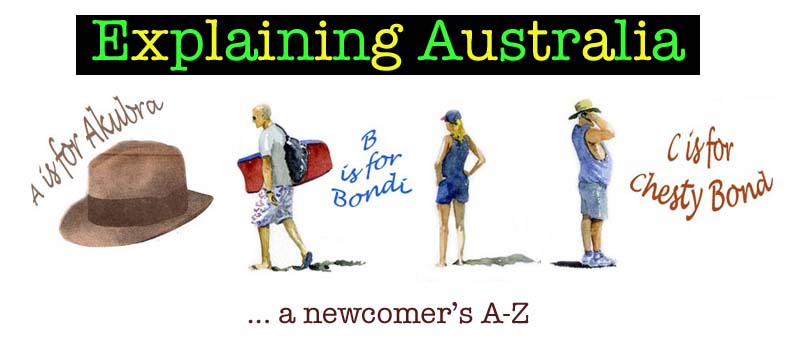
Text & artwork © Michael Kluckner, 2009
Contact me Return to home page
 |
 |
 |
 |
 |
T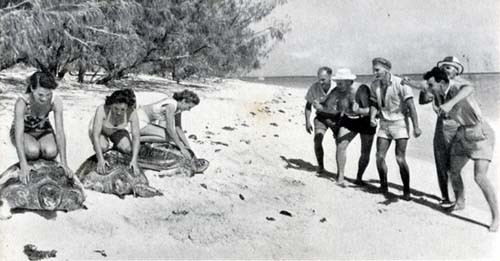 One of
the few races you
possibly can’t bet on at a TAB. “Betting is the
Australian’s passion ....” a photograph by Bernd
Lohse from
Australia and the South Seas, by Bernd Lohse (translated from the
German by Kenneth S. Whitton), Rigby Limited, Adelaide, 1959.
TAB: where you might go if you're a punter and can’t get to the racetrack. They're the betting shops found on the shopping streets of many towns and suburbs. The company also manages casinos. Tall Poppy Syndrome: the tendency to put down anybody, man or woman, who’s an overachiever – someone whose head sticks up above the mob. A man who is a tall poppy would probably be described as "up himself." Perhaps it is an unintended consequence of a democratic, classless society, and shows up in most aspects of life, but never in sports. There you’re either a winner or you’re nobody. One of the curious aspects of Australian culture is the lauding of failure or defeat and the collective amnesia about success. There is Gallipoli, of course. And another example: every schoolchild knows about Burke and Wills – the explorers whose well-financed expedition through the Outback ended tragically – but few remember John McDouall Stuart, who actually succeeded. “Struggle, the more hopeless the better, was glorified, but not success. This has always been the great and basic difference between the Australian and the American. Enterprise, especially ‘big business’ enterprise, was traditionally regarded as alien. Only labour was home-grown; and it was labour largely for the mines and plains and forests and the ultimate movement of the products of the land.” – George Johnston, The Australians, 1965. Tasty: refers to cheese, mainly the excellent locally produced cheddar that is aged a little. There are no packages of "Bland Cheese" for sale, though. Tats: tattoos, the body decoration of the foolish and young. 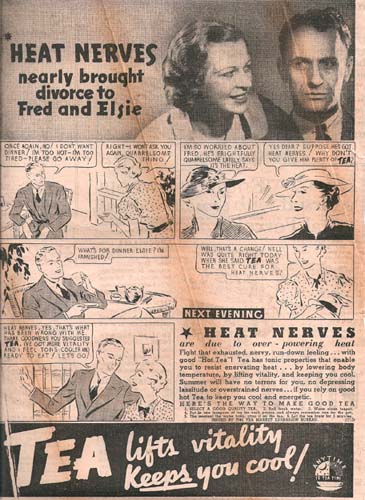 Tea: in the "English" Australia of the era before the Second World War, tea and beer were the national drinks. Wine was for immigrants and was often called "plonk" (even though the industry had been established for a century and was producing excellent vintages) and coffee was said to be American, even though it was more European. “Tea” can also be dinner, especially among the Poms. "Come for tea" might be an invitation for a cuppa and a bikkie or a three-course evening meal. From Elizabeth: my mum used the expression "I have to have a cuppa tea, a Bex and a good lie down." Bex was powder for headaches. She was depressed and did a lot of this! Tim-Tams: a very sweet semi-hollow chocolate-filled chocolate-coated bikkie made by Australia's premier biscuit company, Arnott's. The correct way to enjoy them is to bite off the ends, then use them as a straw to suck coffee or tea from a cup. Less known, perhaps, are Arnott's Iced Vo-Vos, which are evidently popular enough to spawn an imitator by arch-rival Krispy Kreme (like Arnott's, American-controlled). 2009 press release: Arnott's Biscuits has issued a legal ultimatum to doughnut maker Krispy Kreme, alleging that its "Iced Dough-Vo" is too similar to Arnott's "Iced Vo-Vo". Tipping: what a canoe or kayak does. Australians don't tip, explaining the inconsistent service received in restaurants. In restaurants, people tend to round up to the dollar in a cafe, maybe leave a few dollars in a fancier place where there's good table service, but there's none of the "will I leave 12 or 15 % this time?" that jacks the bill up elsewhere in the world. But instead you pay more for the meal itself, especially for entrées (that is, starters). 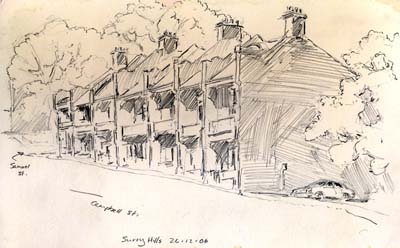 Terrace: a block of rowhouses typical of the 19th-century suburbs of cities, especially Sydney, giving them the look of an English city in the tropics. The classics are two storeys tall. Cramped ones line the narrow streets of working-class areas like Sydney’s Surry Hills, while grander ones with elaborate wrought-iron detailing and spacious, high-ceilinged rooms stand back from the footpaths amidst fronds and palms in posh areas like Paddington. Tomato sauce: Ketchup (or catsup, if you’re American). One of the food groups at a Sausage Sizzle. If you want tomato sauce for a recipe, look for tomato purée. |
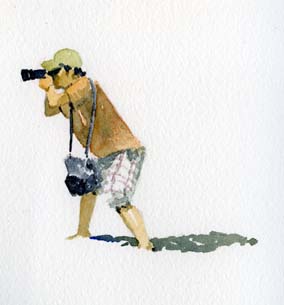 Tourists: the new version of sheep on the Australian landscape – that is, the crop that is essential to the health of the Australian economy. So why would anybody have come up with a major advertising campaign (in 2006) with the slogan, “So Where the Bloody Hell Are You?” to try to entice foreigners to spend their travel dollars here? It played to the widespread belief overseas that some Australians are rude and abrupt, whereas Paul Hogan’s “G’Day” advertisements of the early 1980s played to an equally widespread belief that Aussies are friendly and easy-going. Tourism numbers slumped in the 2000s, due to distance and the natural cycle of trends and fashions. Recent efforts to revive the industry have focused on the premise that all Australian men look like Hugh Jackman. But in spite of such missteps, Australia is still the “#1 Brand” in the world. Future Brand, a consulting firm based in New York, surveyed 2,700 business and leisure travellers to gauge which countries they had visited, which they most wanted to visit and which they would recommend to friends. "It's a large country made up of a lot of things – nature, the Great Barrier Reef, Sydney harbour – and they didn't pick any one of those things," wrote the study's author, Rena Plapler. "They picked ... that it's different in Australia." Trackie-daks: fleecy sweat-pants. Daks were a brand of pants, and the word became synonymous with pants the way biro and esky did for pens and coolers. Underdaks are, not surprisingly, underwear. Tucker: food, a word now used mainly in the North American sense of "grub" for the bush. Not used much anymore. U Ugg Boots: as necessary as electric blankies to get you through the short, sharp, unheated Aussie winter, especially if you live in the south away from the coast where overnight lows plunge into the single digits and draughty houses are cold as charity. Made of sheepskin with the fleece turned inward, they are usually ankle-height and make the same sort of fashion statement as a "flannie" (flannelette shirt): i.e. uncool. But who cares about fashion anyway, especially when it's winter and you live in a house without central heating? Uluru: the most famous non-coastal, non-urban Australian site. Formerly known as Ayer's Rock and since 1993 known as Ayer's Rock/Uluru, it is sacred to the Pitjantjatjara people. You probably would visit it and stay awhile in Alice Springs while touring the Outback. Ergo, it is a place seen by many tourists and a few Australians. Ute: Australia's gift to the motoring world. A ute, short for utility, has a car front or cab, either a Holden or a Ford Falcon, with a truck back, complete with leaf springs and other necessities of a heavy-duty suspension. There are two types: a "box" style, with a tailgate and low built-up sides of curved, painted metal that continue the cab's bodywork like a North American pick-up; or "cab chassis," with a flat tray to which some structure of bars of lattice sides might be welded. Only Falcon utes now come in both box and cab-chassis styles, the latter being unique to Australia, whereas the box style had a few parallels in the USA such as the Chevy El Camino of the 1960s. The box style utes are now rather sleek and flashy, while the cab-chassis ones shout "workingman" or "bloke" to the passing parade in its mincing sedans, reflected in bumper-stickers like "Real Aussies Drive Utes.” Some are customised or feral, with an outlaw quality redolent of hoons, "ute chicks," bull-bars, CB radios, dirt-track races, flame paint-jobs, tough country towns, slabs of beer, ferocious dogs with studded collars, you name it. A copy of "Australian Ute" magazine from the local newsagent will answer all your questions. The term has become a generic one for a pick-up, in the American sense, with small trucks like Toyotas also referred to as utes. 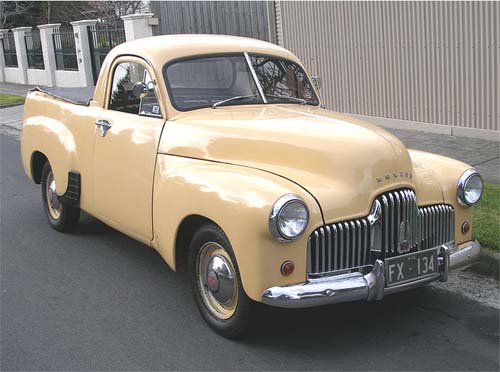 The
original ute: the Holden 50-2106 Coupe Utility, based on the 48-215
sedan, released in January 1951.
V VB: a low-price brand of beer, officially Victoria Bitter, said to be a favorite with footy players, hoons and "westies" (in Sydney's Outer West). Often seen in the roadside litter in the Outback, too. Vegemite: one of the two things all Australians take when they go overseas, the other being a passport. In 1922, Fred Walker of Melbourne created the savoury spread, which bore a startling resemblance to wheel-bearing grease, selling his recipe in 1935 to Kraft who have produced it since. "Growing-up, only pommies and wankers ate marmite; I still haven't tasted it ... People argued about Ford and Holden and we're still arguing about which code of football is best...but apart from cricket, vegemite is one of the great unifying forces – no matter your politics or standing in life, we all love our Vegemite." – an anonymous correspondent to the "History of Vegemite" website. whatscookingamerica.net/History/VegemiteHistory.htm. Among the perils for Australian expats, Vegemite shortages loom large. One crisis occurred recently in Vancouver where some culturally ignorant individual in the only supermarket chain that had stocked Vegemite decided it was the same as the Poms’ Marmite and stopped importing it. Aussie expats dragooned a businessman with a tiny shop selling ugg boots, boomerangs and plush koalas into becoming the supplier. So great was the pressure on him that he air-freighted the first case, selling the small jars at a break-even price of $12. He sold out within hours, but it bought him enough time to begin importing supplies by ship. A crisis was narrowly averted. Vegemite is one of the many iconic Aussie brands owned by foreign-based multinationals. Only slightly less coveted than Vegemite are two of the products of a company owned by Campbell Soup: Arnott’s Biscuits, the maker of Tim Tams and Iced Vo Vos. So far, no Australian Warhol has emerged to immortalise a Tim Tams pack. The famous Speedo cossies have been manufactured by a UK company called Pentland Group for almost 20 years. XXXX and Toohey's beer are owned by the Japanese company Kirin. Akubra, Weet-Bix and Blundstones are still manufactured by Australian-owned companies, although the last has outsourced its production to Asia. Breaking news, June 2009: Vegemite is launching a new flavour, said to be a mix of cream cheese and the original spread, and is looking for a name for it.... W WA: Western Australia, pronounced "double ewe ay," not "wah." Interestingly, South Australia is always pronounced in full, never as "ess ay". Weet-Bix: outwardly almost identical to the Weetabix eaten by sniffling pommy children, Weet-Bix is the Australian "breakfast of champions" – what Wheaties are to Americans. The brand began in Australia in the 1920s and expanded from there, eventually arriving in England with the slightly altered name. It is said that Weet-Bix always retains its crunchiness, reflected in the mnemonic children once used to remember the four points of the compass: Never Eat Soggy Weet-Bix. 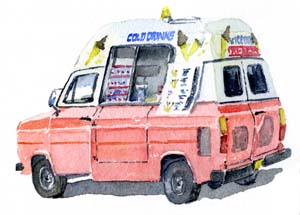 White ants: the insects that destroy trees and the foundations of poorly built houses, getting at them from below. Thus, houses in Queensland, where white ants are most numerous, are built on stilts. The word has another use, as a verb: leaders in politics, business or other organizations can be "white-anted" by disloyal colleagues. Wifebeater: a singlet, at its best when the wearer has lots of body hair and numerous tats. See Chesty Bond. Wine:one of the more profitable ways Australians use their scarce water. Australian wine is part of the "brand" defining Australia overseas. Wowsers: people who not only don't want to have fun themselves, but don't want others to, either. The opposite of larrikins, wowsers manned the barricades in the unsuccessful temperance battles of a century ago. The other key trait of a wowser is prudishness. X XXXX: the Brisbane beer, pronounced "Fourex," that is most identified with Queensland. In the USA it was a condom brand, leading to confusion for tourists some years ago when the brewery ran ads featuring just the slogan, "I can feel a XXXX coming on." Y Yakka (hard): work. Yobbo: a drongo. Yonks: a very long time, as in "Haven't seen them for yonks." Z Z: pronounced "zed," of course, which isn’t e-z to remember for Americans. |
 |
 |
 |
 |
 |
Contact me Return to home page